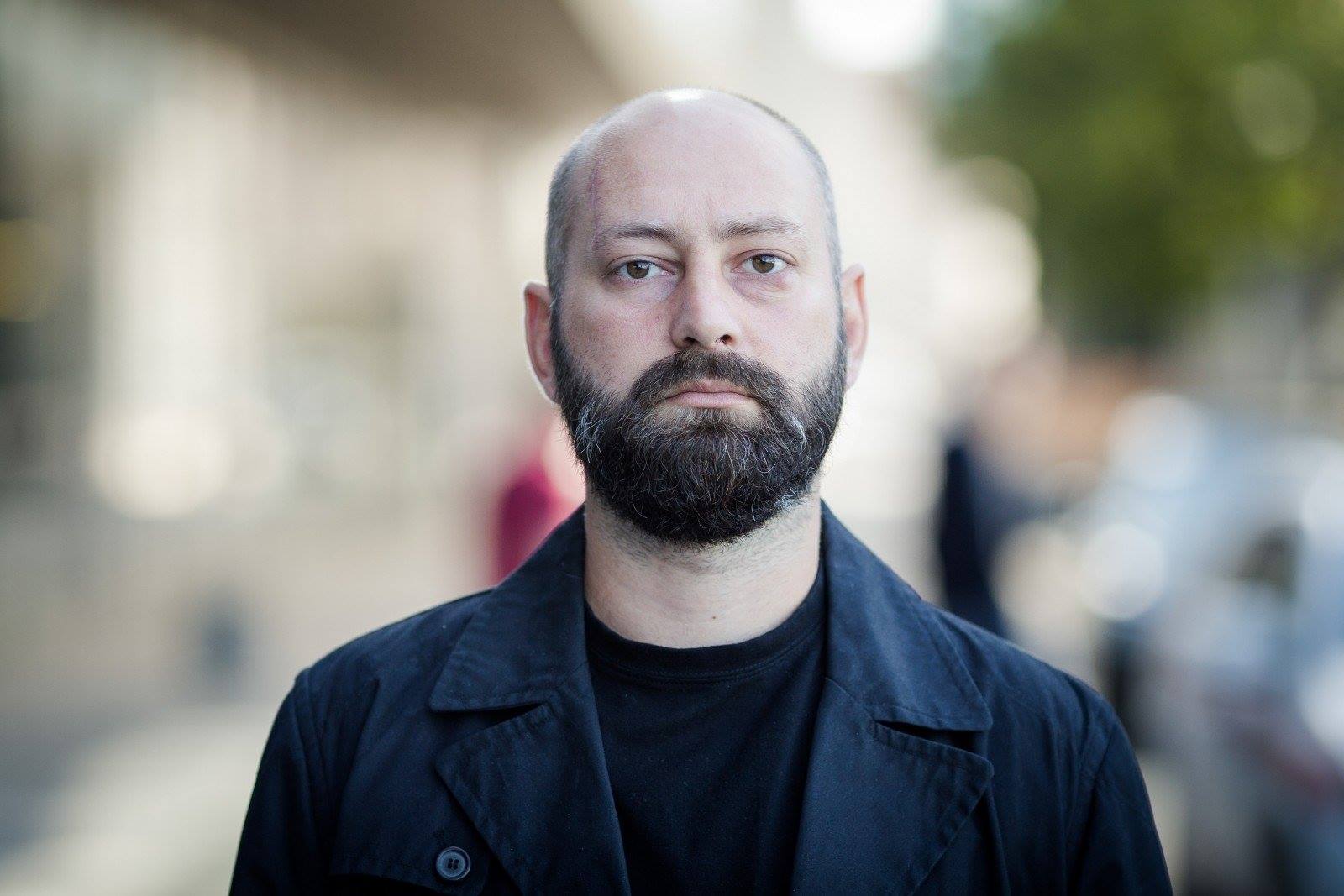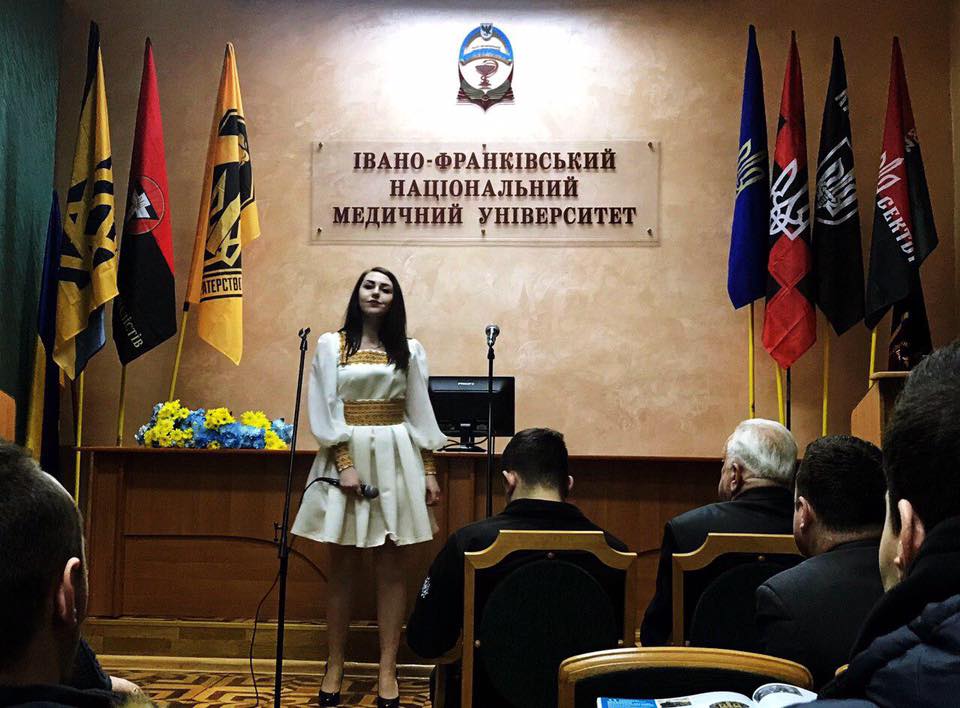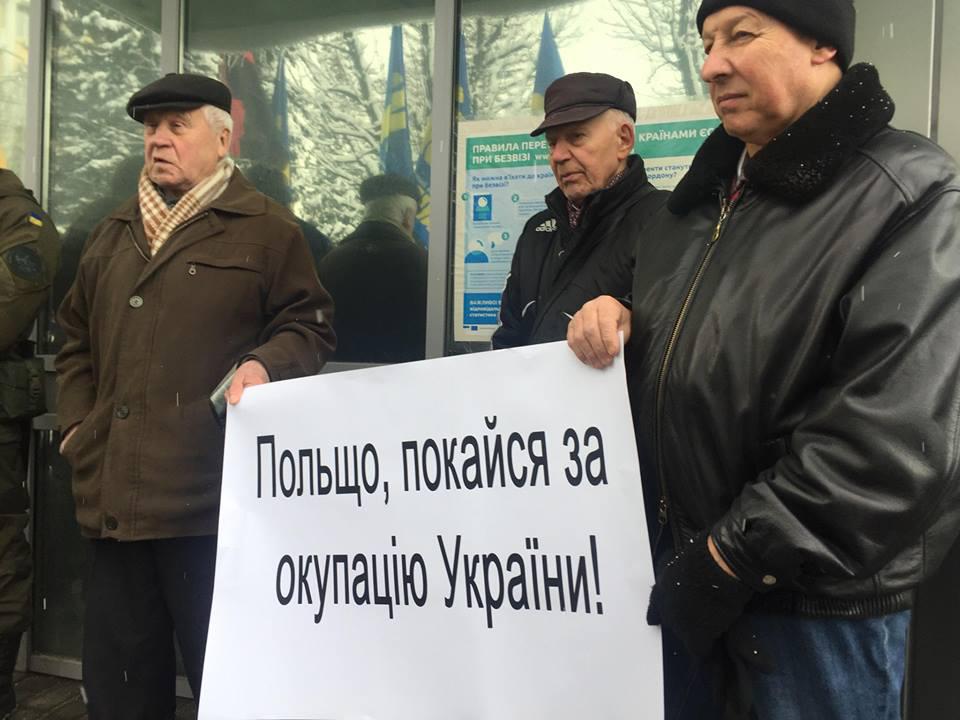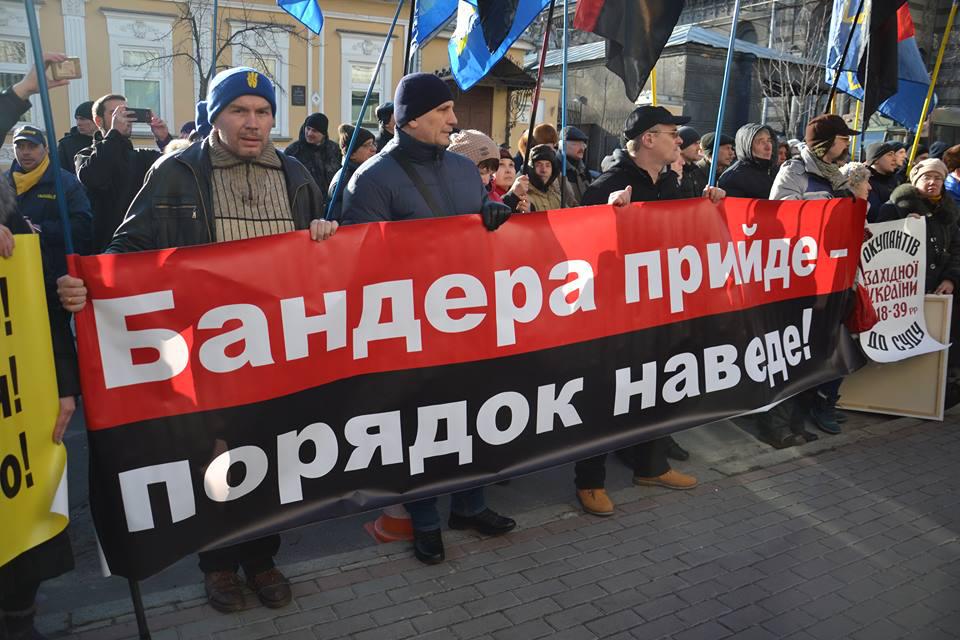The Right Sector, a Ukrainian far-right political party, civic movement, and volunteer battalion deployed in fighting Russian-separatist forces in eastern Ukraine, is a hero of Russian propaganda scare stories. Since it was criminalized by Russia in November 2014, it has also been used to fabricate political arrests, the one of Oleg Sentsov’s “group” being the most famous example. But in nearby Poland, the organization, which, in its own words, professes “Ukrainian nationalism in the Interpretation of Stepan Bandera,” they have also become a no-goer.
On 26 January 2018, the Polish Sejm adopted a law criminalizing the “propaganda of Banderism,” a vague term which nonetheless outlaws the controversial leader of the Organization of Ukrainian Nationalists (OUN). Pursuing the liberation of Polish-ruled Ukraine, Bandera carried out assassinations of Polish officials and was arrested in 1934, he escaped at the onset of WWII and proclaimed the “restoration of the Ukrainian state” in 1941, only to be arrested by the Nazis. Hailed by many in Ukraine as a symbolic liberator and hero who fought against the Soviets and Nazis, in Poland he is regarded as the man who, together with his followers, is largely responsible for the massacre of Poles in Volyn in 1943. Fundamental differences in its understanding of history, its praise of OUN and UPA, the Ukrainian Insurgent Army, and its radical nationalistic approach towards matters of Ukrainian identity make it one of the most disapproved of or even feared groups in Poland.
While it is unlikely doubtful that Poles and Ukrainians we will agree on key ideological and historical questions, should Poles be afraid of this organization? The Polish journalist Paweł Piwowar headed straight to Right Sector leader Andriy Tarasenko to find out.

Paweł Piwowar: In Poland, there is a widespread belief that the Right Sector is an anti-Polish organization. Should Polish people really be afraid of you?
Andriy Tarasenko: First of all, the main principle of the Right Sector is a brotherhood of European nations. Today, people of the European civilization are simply obligated to keep close to each other and act collectively against all phenomena which are destroying the civilization.
We are supporters of the Baltic-Black Sea Alliance (Intermarium). And we believe in the Intermarium with the participation of Poland. Only in this formula are we able to protect the uniqueness of our nations and to economically secure the mutually beneficial relations and the security of all Europe.
By any means, we are not opposed to ethnic Polish people or to the country of Poland in general, but to specific politicians or organizations utilizing Polish chauvinism.
PP: What organizations are you referring to?
AT: Primarily to the nationalist structures (although we don’t see them as real nationalists), for example, Falanga and NS Zadruga, members of which are fraternizing with the neo-Bolshevik terrorists in Donbas or the organization ONR [Obóz Narodowo-Radykalny, the National-Radical Camp – Ed.] I can also recall a group called National Free Poland which appeared on the March of Independence last year.
PP: What actions of those groups show their chauvinism?
AT: Falanga and NS Zadruga fought against Ukraine by the side of Russian-terrorist forces. The eagerness to conquer a foreign land united the Russian chauvinists (both Soviet and anti-fascist leaning) and chauvinists from Poland (so-called “nationalists”).
The aforementioned National Free Poland conducted a ceremonial burning of the national Ukrainian flag. There’s no need to explain what those people meant by such an act.
ONR together with many smaller formations and different political activists constantly talk about the “artificiality” of the Belarusian and Ukrainian nations, and that the western parts of Ukraine and Belarus should be incorporated to Poland.
But more harm comes not from organizations that openly declare chauvinism, but from some Polish officials. They talk about the friendship of our countries, while shyly adding that some of the parts of Ukraine are actually Polish. Such declarations are helping Moscow.
PP: What is the role of OUN-UPA, Stepan Bandera, or Roman Shukhevych in your political and national identity?
AT: It’s a memory about heroes. About people who were not afraid to sacrifice their lives fighting against those who stood in the way of creating the Ukrainian statehood.

PP: The biggest obstacle in Polish-Ukrainian relations are the events of 1943-44, called the Volhynian Massacre in Poland, and the Volhynian Tragedy in Ukraine. Polish historians, as well as the majority of Polish people, believe that the Ukrainian Insurgent Army (UPA) holds the responsibility for these events and that they were a planned action against the Polish nation. Do you agree with that?
AT: I absolutely don’t agree.
Isn’t it strange that the alleged photo showing the “cruelty of UPA” (so called “Galician wreath”) turned out to be a fake? Many publications and books were issued with this picture, while actually, it comes from a Polish newspaper from the 1920s, referring to a story of an insane Romani woman who killed her children. I can also mention a widely-spread picture of Karol Imach, killed by Ukrainian insurgents, which in fact shows a Ukrainian man, a victim of Bolsheviks. Such fakes were found in large numbers.
It means that it’s necessary to mention who started the ”cruelty of UPA” propaganda and who did it much more than others – the Soviet occupation administration.
Yes, during the Second World War there were many fierce fights between the Ukrainian and Polish undergrounds. But in the end, UPA cooperated with the Polish Home Army (Armia Krajowa) and the organization Freedom and Independence (Wolność i Niezależność, by exchanging intelligence information and supplies, as well as executing several major combat actions. Do you think the Polish underground could agree to this knowing that Ukrainian insurgents are conducting a genocide of Polish people? Nonsense!
Such myths, like the myth of the Volhynian massacre, are convenient only for Moscow – both then and now. History is history, but the Smolensk Tragedy – not the work of our hands!

PP: But on the other hand, there are a lot of documents confirming anti-Polish actions of OUN/UPA, which are not fake. Do you want to deny their credibility?
AT: Yes, I do. Activities of OUN-UPA were not directed against the Polish population. There was a human factor in the insurgent war. You mustn’t forget about it. There were separate cases on both sides, cases of, let’s say, an everyday hatred, which then resulted in lawlessness. This is war! Show me a war without such cases.
Ask yourself a question. How many fakes were made among the evidence of the Volhynian massacre? Maybe somebody intentionally wanted to form a myth of genocide based on individual cases [of anti-Polish violence – Ed]?
Polish historians based their research on sound historical evidence, often on documents from Kyiv archives. For example, Grzegorz Motyka quoted g a document published by Polish Institute of National Remembrance together with the SBU archive. I don’t deny that fakes existed, but do you think somebody can fake all the evidence in the archives?
First of all, the Kyiv archives are primarily Soviet archives.
Secondly, I will clarify. I am not trying to convince anyone that there was no inter-ethnic carnage. Those were times of a big war – weapons were were dispersed among the people! I am just saying that there were no genocide. A planned action of OUN-UPA against civilians – that’s a tall story.
It was not an event initiated by an order from some central body. It was tragedy – a result of a purely human factor. And a tragedy by any means not in numbers which are disseminated by Russian chauvinists and some activists in Poland. If Polish and Ukrainian historians, representatives of polarized viewpoints, worked together with the archival documents, to separate politicized fabrications, we would learn the real numbers.
I repeat the most important fact. Do you think that Armia Krajowa and other (Polish) underground fighters would allow themselves to work with banderists, knowing, that they organized the anti-Polish genocide?
PP: I will risk saying that the problem is not the fact that those events happened, but that in Ukraine there are many streets and monuments of the people whom we deem responsible for them. Is the list of Ukrainian heroes really that short?
AT: Heroes of OUN-UPA were prohibited by the Soviet authorities for a long time. By the force of inertia, the post-Soviet system in Ukraine tabooed the recognition of their achievements in history textbooks, on naming streets after them, on erecting monuments to them and so on. Now, our system had to ”rethink” this. The reason for that is a strong social demand for the recognition of heroes. It became possible to remember the volunteers of OUN and UPA on the national level just now. As you can see, it is obvious why such an emphasis is being placed on issues of national memory.
And there’s no reason to forget about the heroes of other times. We honor outstanding countrymen and the Kyivan Rus, the Kozaks, and the contemporary volunteers on the front in Donbas.

PP: What are the ways of solving the problem with our unsettled historical issues? What measures can Poland take to improve our relations?
AT: Regarding our heroes which seem to be a problem for the certain part of your society: different views of Ukraine and Poland regarding our common history are a right of each of us. We all have to be aware of this. We need to respect each other and not impose our way of seeing the history as the ultimate truth.
But if we are to build our relations on remembering the bad things (“In century such-and-such you did this-and-that to us”, “and you have done this-and-that to us even before that”) then nothing good will come out of this. Christian values and morality are a part of both Polish and Ukrainian culture. So let’s finally embrace the formula “we forgive and ask for forgiveness.”
On such things, our political elites should agree. But we, as the Right Sector, believe that it is not possible with the current government both of Ukraine and Poland. However, the healthy conservatism of the latter attracts many Ukrainian nationalists.
PP: What do you mean by ”healthy conservatism” and how does it attract them?
AT: I understand it as a protection of the traditional identity of Poland by your government. For example, your elites refused to accept Syrian migrants and, in general, they maintain a responsible approach to the issue of the immigration control. They did not allow the legalization of abortion, they continue a positive dialogue with the Catholic Church, they are not afraid to defend Poland’s sovereignty from the Brussels bureaucracy, unlike other EU states. To protect national identity is always commendable!
PP: What do you think about the statements of Ukrainians about returning Przemyśl to Ukraine? Are those just loud ironic slogans or sign of a possible conflict?
AT: I repeat. Different views of both Poland and Ukraine on our common history are the right of each of us. That’s why Ukrainian people in Ukraine have the right to deem Przemyśl as their own. Moreover, if you look into the past, there are prerequisites for such declarations. Are those prerequisites reasonable or petty – it’s only up to the Ukrainians to decide for themselves and for Poles to themselves. We need to agree that we are different – and that’s normal.
It is quite another matter to talk about the possibility of a military conflict between our states. It’s absolutely out of the question!
In the current period of history, it is in general very stupid to talk about the expansion of any nation of the European civilization. We observe the decrease in the percentage of the indigenous population of all countries of Europe. Because of the problems of economic migration and the aging of the population, Poles must think how to keep their current lands Polish (ethnically and culturally), and Ukrainians – their own. That’s what’s relevant for our nations, not expansion.

PP: Who benefits from the conflict between Poles and Ukrainians? For whom in Poland and Ukraine is it convenient to aggravate it?
AT: Aggravation of disagreements between our countries is visibly a result of an external activity. In Ukraine, there is a real war with the hybrid forces of the Russian Federation. This war is not only an armed conflict but, more importantly, an information war. What could be more comfortable for Putin than tossing us another conflict in the West? This is being done to make Polish people forget how dangerous Russia is. So you see Ukrainians as a common enemy, shared with Russia.
It is hard to imagine that another conflict could be convenient for anybody in Ukraine, apart from the Kremlin’s accomplices. Poland also faces enough of its own challenges in the modern world to think about another conflict with Ukraine.
Let’s burn Soviet and nowadays Russia’s lies with hot iron! What really creates controversy in history – may it remain individual for each of our nations. It will be more constructive to focus on future common projects.

Cooperation: Anna Kharchenko






